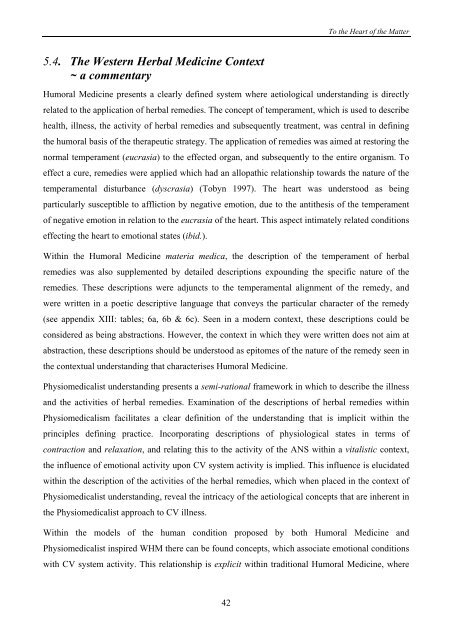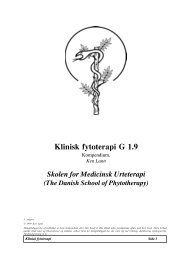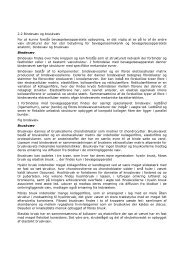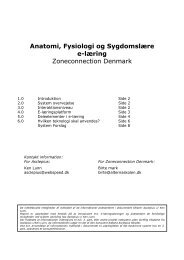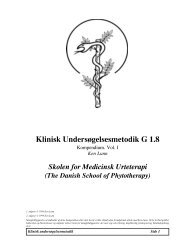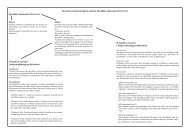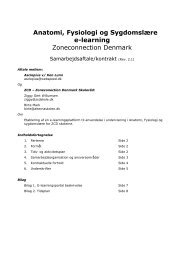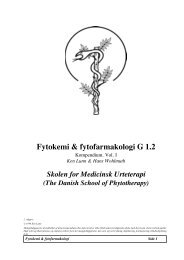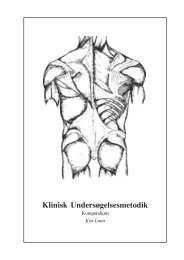PDF File - Asclepius Herbal Consultancy
PDF File - Asclepius Herbal Consultancy
PDF File - Asclepius Herbal Consultancy
Create successful ePaper yourself
Turn your PDF publications into a flip-book with our unique Google optimized e-Paper software.
5.4. The Western <strong>Herbal</strong> Medicine Context<br />
~ a commentary<br />
To the Heart of the Matter<br />
Humoral Medicine presents a clearly defined system where aetiological understanding is directly<br />
related to the application of herbal remedies. The concept of temperament, which is used to describe<br />
health, illness, the activity of herbal remedies and subsequently treatment, was central in defining<br />
the humoral basis of the therapeutic strategy. The application of remedies was aimed at restoring the<br />
normal temperament (eucrasia) to the effected organ, and subsequently to the entire organism. To<br />
effect a cure, remedies were applied which had an allopathic relationship towards the nature of the<br />
temperamental disturbance (dyscrasia) (Tobyn 1997). The heart was understood as being<br />
particularly susceptible to affliction by negative emotion, due to the antithesis of the temperament<br />
of negative emotion in relation to the eucrasia of the heart. This aspect intimately related conditions<br />
effecting the heart to emotional states (ibid.).<br />
Within the Humoral Medicine materia medica, the description of the temperament of herbal<br />
remedies was also supplemented by detailed descriptions expounding the specific nature of the<br />
remedies. These descriptions were adjuncts to the temperamental alignment of the remedy, and<br />
were written in a poetic descriptive language that conveys the particular character of the remedy<br />
(see appendix XIII: tables; 6a, 6b & 6c). Seen in a modern context, these descriptions could be<br />
considered as being abstractions. However, the context in which they were written does not aim at<br />
abstraction, these descriptions should be understood as epitomes of the nature of the remedy seen in<br />
the contextual understanding that characterises Humoral Medicine.<br />
Physiomedicalist understanding presents a semi-rational framework in which to describe the illness<br />
and the activities of herbal remedies. Examination of the descriptions of herbal remedies within<br />
Physiomedicalism facilitates a clear definition of the understanding that is implicit within the<br />
principles defining practice. Incorporating descriptions of physiological states in terms of<br />
contraction and relaxation, and relating this to the activity of the ANS within a vitalistic context,<br />
the influence of emotional activity upon CV system activity is implied. This influence is elucidated<br />
within the description of the activities of the herbal remedies, which when placed in the context of<br />
Physiomedicalist understanding, reveal the intricacy of the aetiological concepts that are inherent in<br />
the Physiomedicalist approach to CV illness.<br />
Within the models of the human condition proposed by both Humoral Medicine and<br />
Physiomedicalist inspired WHM there can be found concepts, which associate emotional conditions<br />
with CV system activity. This relationship is explicit within traditional Humoral Medicine, where<br />
42


